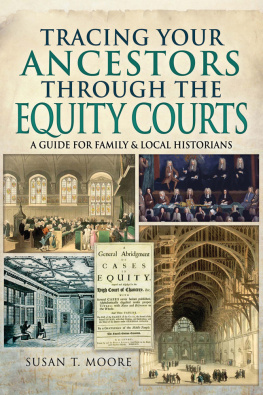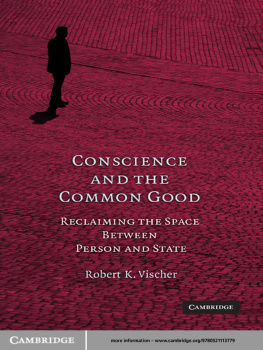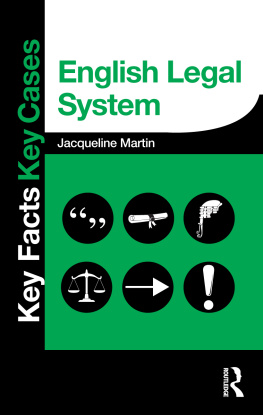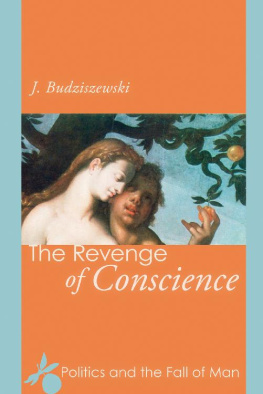First published 2010 by Ashgate Publishing
Published 2016 by Routledge
2 Park Square, Milton Park, Abingdon, Oxon OX14 4RN
711 Third Avenue, New York, NY 10017, USA
Routledge is an imprint of the Taylor & Francis Group, an informa business
Copyright 2010 Dennis R. Klinck
Dennis R. Klinck has asserted his right under the Copyright, Designs and Patents Act, 1988, to be identified as the author of this work.
All rights reserved. No part of this book may be reprinted or reproduced or utilised in any form or by any electronic, mechanical, or other means, now known or hereafter invented, including photocopying and recording, or in any information storage or retrieval system, without permission in writing from the publishers.
Notice:
Product or corporate names may be trademarks or registered trademarks, and are used only for identification and explanation without intent to infringe.
British Library Cataloguing in Publication Data
Klinck, Dennis R., 1946
Conscience, equity and the Court of Chancery in early modern England.
1. Equity England History 16th century. 2. Equity England History 17th century. 3. Great Britain. High Court of Justice. Chancery Division Rules and practice. 4. Judicial opinions England History 16th century. 5. Judicial opinions England History 17th century. I. Title
346.4200409031dc22
Library of Congress Cataloging-in-Publication Data
Klinck, Dennis R., 1946
Conscience, equity and the Court of Chancery in early modern England / Dennis R. Klinck.
p. cm.
Includes bibliographical references and index.
ISBN 978-0-7546-6774-2 (hardcover: alk. paper) 1. Equity England History. 2. England and Wales. Court of Chancery History. 3. Great Britain. Court of Chancery History. I. Title.
KD674.K58 2009
347.42026dc22
2009020348
ISBN 9780754667742 (hbk)
ISBN 9781315573465 (ebk)
Preface
My initial encounter with judicial equity occurred when, as a somewhat reluctant mature first-year law student at the University of Saskatchewan in 1979, I received an information package telling me that I should read Glanville Williamss Learning the Law in preparation for the start of classes. Reading the book, I was particularly struck by the revelation that there were, at least historically, two parallel jurisdictions in English law, the common law and equity. This was something totally unexpected for me, something about which I had no previous inkling. As an erstwhile student of literature, I was struck as well by Williamss reference to Ashburners account, by way of metaphor, of the ostensible effect of the Judicature Act: the two streams of law and equity run side by side in the same channel, but they do not mix their waters.
Throughout my legal studies, I continued to encounter allusions to equity, but I had no very clear idea what it was, and, at that time, I did not really think about it very searchingly. Later, when I began my law teaching career at McGill University, I was asked (quite fortuitously, since at that time I thought of my interests as the Charter of Rights and Freedoms and Criminal Law), to teach a course entitled Equity and Trusts. Frankly, when first teaching the course, I treated it as a rather doctrinal exposition of the law of trustsmuch like the course Trusts which I had taken as a studentand I did not pay much explicit heed to the equity part.
However, when a proposal was brought forward to change the name of the course from Equity and Trusts to Trusts and Estates, I was moved to think a little more deeply about equity. The argument advanced by some colleagues of a rather pragmatic persuasion was that equity, at least in this context, was an obsolete and meaningless concept, and that we should be teaching the actual, practical law. Having, before reading the law, completed a doctorate in English literature, concentrating on early seventeenth-century drama, I reacted instinctively against the idea that because something was old, or old-fashioned, it was to be discarded. This was probably the real inception of my continuing efforts to come to some understanding of judicial equity and its role in the contemporary legal dispensation. As is so often the case, I found that the more one actually explores a subject, actually gets into it, the more complex or even mysterious it appears. I shall not attempt to chronicle my still inconclusive efforts to come to grips with equity.
One cannot delve very far into judicial equity without encountering the notion of conscience. The Court of Chancery was, historically, a court of conscience; the Chancellor was the keeper of the sovereigns conscience; certain kinds of conduct were sanctioned by the Court because they were against conscience. This struck me as vaguely interesting, but I was, at least at first, content to consign it to the realm of historical curiosity. But something else struck me as wellthe fact that conscience kept appearing as an ostensibly living part of the modern discourse of equity. This I found rather anomalous. Like many others, I suppose, I thought of conscience very much as the individual persons subjective sense of right and wrong, not as some kind of objective standard of conduct, imposed from without, as the law tends to be. Indeed, many of the contexts in which I had encountered conscience tended to oppose it to law: so, for example, the Canadian Charter protects freedom of conscience. This suggests to me that laws unreasonably interfering with the diversity of personal conscience might be inoperative. Conscience is personal moral intuition, insulated from the intrusiveness of law.
This led me to contemplate how consciencewhich on one view can be idiosyncratic moral judgment, which provides the criteria specific to the individual by which that individual assesses his or her conductcan be reconciled with law. My questions in this regard were hardly original: like every other student of the common law (at least until recently), I had encountered John Seldens complaint that equity is a roguish thing and that judgment according to the individual Chancellors conscience could be analogized to measurement according to the length of the individual Chancellors foot. Indeed, I ultimately co-authored, with one of my research assistants, Loris Mirella, a paper examining aspects of the invocation of the metaphor of the Chancellors foot in modern Canadian case law. One aspect of this matter that particularly engaged my attention was the tendency of at least some modern courts to speak of conscience in the context of equity as if it was essentially the same concept as that which might have been invoked by a medieval ecclesiastical Chancellor. It seemed at least problematic to me to assume that the concept had endured more or less unchanged over the centuries.
This is the background to the present study, which is an attempt to elaborate, fairly comprehensively, the contexts for understanding conscience in the early period, and particularly to interrogate whether earlier understandings of conscience might have been more accordant with its being a juristic principle. I use the expression fairly comprehensively deliberately. Various aspects of the question have, of course, been examined before. Part of my aim is to bring together what is known into one volume. I hope that, while covering the ground, I have been able to dig more deeply. My treatment is also








